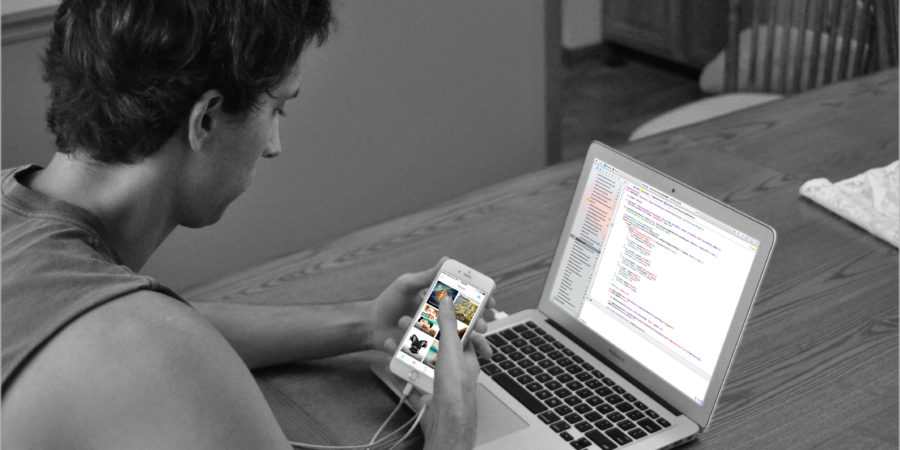Young entrepreneur’s app Dozmia brings fresh, legal tunes to businesses

Think back to the last, best meal you enjoyed in a restaurant. Maybe you think of brunch at the new independent coffee shop in your neighborhood, or perhaps your mind goes to the incredible dinner you enjoyed with your spouse at a local steakhouse. What stands out about the meal other than the company and the food?
Chances are, your answer is the atmosphere. The décor, the staff and the sounds played in a business add a layer to the customer experience that you are not likely to forget. You certainly can remember that there was music playing as you dined.
“Music is really important for a business’ atmosphere and for their customers,” says entrepreneur and app inventor Nicholas Rubright, 23. “The right music can increase customer retention — customers are more likely to stay longer and recommend a business to their friends.”
Rubright should know. In May, he launched an app dubbed Dozmia (www.dozmia.com), a music streaming service similar to Pandora or Spotify, where users can stream individual songs or entire playlists of music through their phones or other devices and he is now bringing it to St. Johns County.
Dozmia offers several important features that aren’t available anywhere else.
First and foremost, Dozmia works with businesses to create custom playlists. Songs are hand-picked by the Dozmia staff to help businesses build the right atmosphere and reach their business goals — providing licensed music that can be streamed legally.
“A lot of businesses think they can play music off of their iPod or through any streaming service,” Rubright said. “But in many cases, that’s actually illegal.”
Rubright teamed up with attorney Jesse E. Morris of Morris Music Law in order to navigate the complicated world of music licensing for businesses.
Morris explained that in order to stream music or even play music that the owner has purchased on compact disc, in most cases the business must obtain a performance license from four Performing Rights Organizations.
If qualifying businesses do not obtain these four separate licenses and continue to play music, each Performing Rights Organization may send the business a notice.
“If they’re contacted several times and they refuse to pay, then they often are sued and are liable for copyright infringement,” Morris said. “This can cost hundreds of thousands of dollars and can shut a business down.”
Rubright worked with Morris to create a system where he could legally pay artists and songwriters as well as offering businesses a copyright-compliant way to stream music. All of the music offered through the Dozmia app is licensed in a way that businesses are able to stream it legally.
This makes sense for Rubright, who is an artist himself.
“When I was in high school, I used to promote concerts with the youth group at my church, Orange Park United Methodist,” he said. “I met a lot of musicians that way, and I played in bands in high school.”
He says that learning to play guitar became an emotional outlet.
“I discovered music’s emotional power through that,” he said. “I think music is a really important part of life. I wanted to build this app because I thought it was a bigger way I could touch more people with this.”
The road to developing the app, however, was a rocky one.
While he was pursuing a marketing degree at the University of North Florida, Rubright approached an app developer and paid a premium to have the freelancer build the app of his dreams.
“He built it and it was sitting in iTunes,” Rubright remembers. “But before we submitted the app, someone stole the laptop with all of the code. It was sitting right there on iTunes, and we couldn’t get it back.”
Rubright did not allow this frustrating turn to stop his progress. Determined to make the app a reality, Rubright took six months learning how to code, and rebuilt his app from scratch in three months.
“I learned programming with no previous experience,” he said. “I found a website online that was for first-time programmers. It was a lot of trial and error.”
Rubright says his biggest advice to other young entrepreneurs is to “just go at it.”
“In the beginning, my idea of a startup was that I’d go out and raise money and build my company,” Rubright said. “But you have to build it from the ground up if you’re young. You have to get started with something and just go.”
Rubright recalled that he was nervous about uploading his self-built app, concerned that people would download it, hate it, give bad reviews, and never come back. Instead, he found the first version a valuable learning experience and regretted not uploading faster.
Dozmia already has signups from successful artists and local business clients.
Another unique thing about Dozmia is the option for customers to download a branded playlist if they like what they hear. For example, someone who likes the playlist they hear in a coffee shop will be able to use the app to save and stream that playlist any time they want.
“If someone walks in and saves the playlist, it’ll be saved with the business’ logo,” Rubright explained. “Customers can take it with them and send it to friends. It’s a cool way for a business to be a part of the rest of the customer’s life.”
Rubright says he hopes that other businesses like hotels will try the service.
“If a hotel uses it, a customer might experience that playlist for their whole vacation,” he said. “There are so many things that a playlist can do for a business.”
For more information about licensing music for businesses or questions for artists, visit www.morrismusiclaw.com.
More information about Dozmia for businesses, artists, and users can be found at www.dozmia.com. The app is available via the iTunes app store.
Photo graphic courtesy Nicholas Rubright
Entrepreneur Nicholas Rubright has invented a music app for businesses where users can legally stream individual songs or entire playlists of music through their phones or other devices.





Comments are Closed